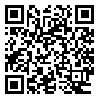Volume 5, Issue 1 (March 2018)
Health Spiritual Med Ethics 2018, 5(1): 33-39 |
Back to browse issues page
Download citation:
BibTeX | RIS | EndNote | Medlars | ProCite | Reference Manager | RefWorks
Send citation to:



BibTeX | RIS | EndNote | Medlars | ProCite | Reference Manager | RefWorks
Send citation to:
khaki I, Abbasi M, khalajinia Z, Momenyan S. Barriers to Observance of the Codes of Professional Ethics in Clinical Care: Perspectives of Nurses and Midwifery of Hospitals Affiliated with Qom University of Medical Sciences in 2016. Health Spiritual Med Ethics 2018; 5 (1) :33-39
URL: http://jhsme.muq.ac.ir/article-1-190-en.html
URL: http://jhsme.muq.ac.ir/article-1-190-en.html
1- Department of Midwifery, School of nursing and midwifery, Qom University of Medical Sciences Qom, Iran., School of nursing and midwifery, Qom University of Medical Sciences Qom, Iran
2- Department of Nursing, School of nursing and midwifery, Qom University of Medical Sciences, Qom, Iran.
3- Department of Midwifery, School of nursing and midwifery, Qom University of Medical Sciences Qom, Iran., School of nursing and midwifery, Qom University of Medical Sciences Qom, Iran ,Zkh6033@yahoo.com
4- Paramedical Sciences Faculty, Shahid Beheshti University of Medical Sciences, Tehran, Iran.
2- Department of Nursing, School of nursing and midwifery, Qom University of Medical Sciences, Qom, Iran.
3- Department of Midwifery, School of nursing and midwifery, Qom University of Medical Sciences Qom, Iran., School of nursing and midwifery, Qom University of Medical Sciences Qom, Iran ,
4- Paramedical Sciences Faculty, Shahid Beheshti University of Medical Sciences, Tehran, Iran.
Abstract: (5297 Views)
Background and Objectives: The observance of professional ethics is one of the most important expectations from health care team whose application has a tremendous effect on treatment course. The aim of this study was to investigate barriers to observance of the codes of professional ethics in clinical settings from the perspectives of nurses and midwifery in hospitals affiliated with Qom University of Medical Sciences in 2016.
Methods: This descriptive cross-sectional study was conducted with 246 nurses and midwives working in the public hospitals affiliated with Qom University of Medical Sciences. The data collection instrument was a questionnaire (developed by Dehghani et al.) to investigate the observance of professional ethics in the three domains management, environmental and individual care-related.
Results: In the management domain, the most important barrier to implementing the codes of professional ethics in clinical settings were lack of in-service training and educational programs from midwives’ perspectives (2.2±0.9) and inappropriate head nurse-staff communication and lack of in-service training and educational programs from nurses’ perspectives (2.53±1.19, and 2.53±1.06, respectively), in environmental domain, lack of suitable equipment in ward from midwives’ perspectives (2.03±0.94) and rotational shiftwork from nurses' perspectives (2.32±1.07) and in individual care-related domain, lack of technical skills from both midwives’ and nurses’ perspectives (2.29±1.21 and 2.65±1.23, respectively).
Conclusion: According to the results of this study, individual care-related factors were among the most important barriers to observing professional ethics from the perspectives of nurses and midwives working in hospitals.
Methods: This descriptive cross-sectional study was conducted with 246 nurses and midwives working in the public hospitals affiliated with Qom University of Medical Sciences. The data collection instrument was a questionnaire (developed by Dehghani et al.) to investigate the observance of professional ethics in the three domains management, environmental and individual care-related.
Results: In the management domain, the most important barrier to implementing the codes of professional ethics in clinical settings were lack of in-service training and educational programs from midwives’ perspectives (2.2±0.9) and inappropriate head nurse-staff communication and lack of in-service training and educational programs from nurses’ perspectives (2.53±1.19, and 2.53±1.06, respectively), in environmental domain, lack of suitable equipment in ward from midwives’ perspectives (2.03±0.94) and rotational shiftwork from nurses' perspectives (2.32±1.07) and in individual care-related domain, lack of technical skills from both midwives’ and nurses’ perspectives (2.29±1.21 and 2.65±1.23, respectively).
Conclusion: According to the results of this study, individual care-related factors were among the most important barriers to observing professional ethics from the perspectives of nurses and midwives working in hospitals.
Type of Study: Original Article |
Subject:
Special
Received: 2017/07/31 | Accepted: 2017/10/7 | Published: 2018/02/13
Received: 2017/07/31 | Accepted: 2017/10/7 | Published: 2018/02/13
Send email to the article author
| Rights and permissions | |
 |
This work is licensed under a Creative Commons Attribution-NonCommercial 4.0 International License. |








